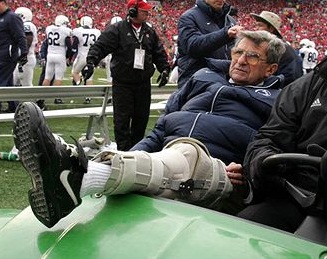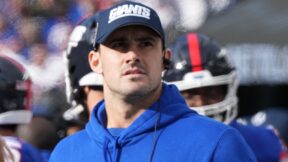Joe Paterno’s Legacy Marked by Accomplishments and Scandal
 Joe Paterno’s death on Sunday added yet another tumultuous twist to a story that has already seen a roller coaster’s share of turns. Following the passing of one of the most iconic figures in the history of college sports, it now remains to be seen how the coach’s legacy will be written.
Joe Paterno’s death on Sunday added yet another tumultuous twist to a story that has already seen a roller coaster’s share of turns. Following the passing of one of the most iconic figures in the history of college sports, it now remains to be seen how the coach’s legacy will be written.
Legions of Penn State fans, Paterno supporters, and former players will undoubtedly remember his transcendent contributions to college football. They will describe the mark he left on a multitude of athletes that he coached and the impact he had on State College, Pennsylvania, a bustling college town of 40,000-plus people that love their football and idolized their longtime football coach. For most of the sports world and society writ large, Paterno will forever be remembered as the record-setting coach whose career was undone with one large stroke of ignominy.
Simply put, the bespectacled Paterno was larger-than-life. He was JoePa to all who knew him. Generations grew up around Penn State football and a coach whose career in State College as an assistant and head coach spanned over 60 years. Sure, he was JoePa. He could very well have been Joe-PA, since at times his stock ran so high he would rival William Penn as the most representative figure in the history of the state. His accomplishments on the field were deserving of such hyperbole.
To enumerate his career accomplishments is to dabble in the unbelievable. He won 409 games. No other coach in college football’s top level of competition has won 400, seemingly dwarfing Bobby Bowden’s herculean 377 career win total. In his 46 years as the head coach of the Nittany Lions, he had a winning record in 38 of them. He won two national titles, 24 bowl games, and had a mantle filled with numerous awards and honors bestowing his allegorical coaching prowess.
To those that knew him on and off the field he may well have just been Joe Pa: a veritable father-like figure who had an impactful influence on those around him or people who simply followed his career, and was well-known for his contributions to academia at Penn State in addition to his program’s graduation rate during his tenure. The idolatry felt for the Hall of Fame coach was symbolized by the bronze statue that stands outside Beaver Stadium, standing guard over the 100,000-plus fans during home games, and will no doubt serve as a de facto memorial site for scores of admirers in the coming weeks and months.

JoePa demanded the hard work and dedication from his players that was in turn reflected in his own unyielding determination. In college I hosted a radio show to feed my broadcasting aspirations. No, it wasn’t a highly-rated affair: If I could find two more listeners, I probably would have doubled my ratings. But, I can remember during a show in 2004 when I suggested that Paterno retire. The team was in the midst of one of the worst seasons during his tenure. They lost seven of their first nine games en route to a woeful 4-7 season. He did not retire. In fact, the very next year the team went 11-1 including an Orange Bowl win over Florida State which served as a matchup between two of the greatest minds, in Paterno and Bowden, that the game has ever seen. Paterno could very well have hung up the whistle after getting steamrolled by a Wisconsin linebacker during a game in November 2006, suffering a fractured shin bone and damaged knee ligaments that would be painful for a 29-year old, much less than a then-79-year old. Not only did he continue to coach from the press box, he soon returned to the sidelines. He kept coaching after having hip replacement surgery, leading the team from on high again during the 2009 Rose Bowl; and, again, he was there on the sideline in 2011 despite a fractured hip and shoulder.
However, not every story has a fairy tale ending. Paterno’s mythical legend began to unwind in November 2011, with the revelation of one of the most heinous scandals in the history of college sports. Jerry Sandusky, a former Penn State defensive coordinator, a close friend of the coach’s, and one-time heir apparent to Paterno, was arrested and subsequently charged with 52 counts of sexually molesting ten young boys over fifteen years, some of the crimes allegedly occurring on campus at the football program’s facilities. As more details of the story unfolded, the foundation of Penn State football, one of the few remaining programs in the country without any major rules violations, was shaken to its very core. Grand jury testimony in 2011 from then-wide receivers coach Mike McQueary, who witnessed one of these awful episodes, put the hallowed Paterno right in the middle of this sinister disclosure. Paterno was informed of what happened, said McQueary, but he disclosed the details only to university officials and not police investigators.
Disbelief reigned among those who lived near the epicenter. Shock and horror prevailed both inside and out of the sporting world. Paterno gave flimsy explanations about his response to hearing about the details that disgusted a nation caught off-guard by these allegations. Penn State president Graham Spanier was forced out. McQueary was placed on leave. Then the final axe came down. Following days of speculation, Paterno, who often waved off questions of his retirement despite his age, was officially fired November 8, 2011. Paterno’s name was taken off the Big Ten football championship trophy. Penn State’s general was cashiered in front of a worldwide audience, his epaulette stripped and his program taken away as his punishment.
Paterno had knowledge of the fiendish happenings occurring during his tenure as the leader of the football program. We are now only left to speculate as to the reasons why a luminary who dedicated most of his life to instructing impressionable youths and setting examples decided to violate one of the fundamental tenets of coaching: to teach lessons that one would expect others to follow. A great career was punctuated with a question. Why? Why did he not do more to prevent further crimes? His whole livelihood was spent educating minds and nurturing young lives. Why in the end did he fall so spectacularly short in helping the few whose lives are forever marred because the proper authorities weren’t notified at the times these crimes were being committed?
Certainly he isn’t the only great coach in history whose gleaming career accomplishments were permanently blemished with a shameful lack of judgment. Woody Hayes’ punch to the facemask of Charlie Bauman, leading to the legendary Ohio State coach’s ouster, will be forever linked with the career of the Hall of Famer. The incident undoubtedly haunted Hayes during the final decade of his life. However, were one to juxtapose the two incidents, it nearly seems like night and day.
For someone of Paterno’s stature, a coach who suffered only 136 losses in his nearly half-century career as a head coach, the loss of his job, the program he built through years of recruiting and teaching, was by far his biggest defeat. His defining victories buoyed a campus. His contributions framed a community. But, in the end, all that was accomplished after years of building came crashing down in the wake of uncharacteristically poor decision-making. Football was metaphorically his beating heart. It’s a major reason why he continued coaching on Saturdays in spite of advancing age and a family that was growing old apart from him. Not too long after losing his figurative heart and soul, his literal heartbeat soon followed.
The city of State College has long been known as Happy Valley. Over the last three turbulent months, though, such a moniker would seem far from apt in describing the area. Appropriately enough, on Sunday with the announcement of JoePa’s passing, the skies opened up and it rained.
With the hallowed coach now gone and the program he cherished lying in pieces, it seems like a sad piece of dark irony that Joe Paterno’s final coaching lesson to all of us is not one of the greatness that can be achieved through the perseverance and persistence that led to Joe’s once-celebrated aura, but, rather, it is to avoid the choices that led to the coach’s ultimate undoing.







